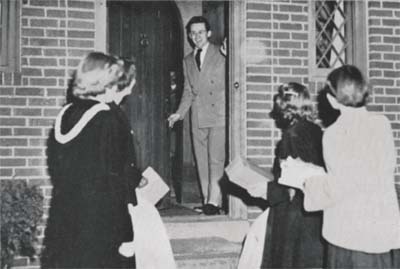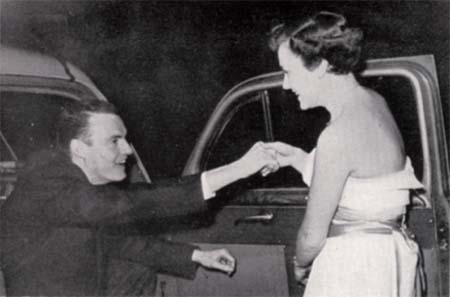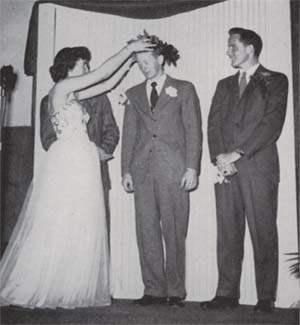 |
 |
| current issue |  | past issues |  | send a letter/news |  | address update |  | advertise |  | about us |  | alumni home |
| Spring 2009 |

|
| Departments |

|
| Alumni News |
| Alumni Profiles |
| Book Reviews |
| Campus Currents |
| Class Notes |
| Features |
| History Page |
| Letters to the Editor |
| Obituaries |
| President's Column |
| Question/Answer |
| University Research |

|
| Department Archives |
| Table of Contents |
|
Search UNH Magazine: |
On Ben's Farm
|
Stimulus Plan
UNH's weeklong version of Sadie Hawkins Day was a hit By Mylinda Woodward '97 |
Easy to print version |

|
Just a few years after cartoonist Al Capp introduced the first Sadie Hawkins Day race in his "Li'l Abner" comic strip in 1937, girl-pursues-boy events were sweeping the nation's high schools and colleges.
At UNH, the rage caught on in 1948 when the Pan-Hellenic Council decided that its annual spring ball would be a Sadie Hawkins affair. Women students would issue the invitations, pay for the tickets, pick up their dates and provide boutonnieres.
The dance was a hit, despite some initial hiccups. Dick Dart '49 recalls that when he was elected "King" of the dance, no one knew what to do. "It was somewhat awkward when the time came for the crowning," says Dart. "I remember a long pause."
That fall, UNH cartoonist and columnist Carl Siembab '50 proposed the idea of a "Male Economic Recovery Plan," or MERP, a weeklong event when the girls would pay for everything. "In this way, the girls will not only have the pleasure of repaying the boys," Siembab explained, "but will also learn the importance of financial responsibilities."

|
A student poll found that most of the women students were up for it--provided it didn't last longer than a week--and the men were more than willing. A typical MERP week began on Thursday evening with a movie or a dance. Friday night was the big Pan-Hell ball. On Saturday there were parties and dances, and on Sunday, the week wrapped up with buffet suppers at the sororities.
MERP week continued as a popular UNH tradition for more than two decades, even though curfews for women were dropped in 1969 and Stoke Hall went co-ed a couple of years later. While it was no longer taboo for a woman to ask a man out, the Pan-Hellenic Council continued to organize annual MERP activities until the late 1970s.
Gary Stewart '70, '72G, '75G recalls that while MERP was designed "to save guys money, it was much more than that. Many times a girl would ask you to go to the movies, or something like that, to show you that she was interested in you. Girls would not call guys constantly and ask them out like today, so an advance by a girl was welcomed."
 fiRST KING: Dick Dart '49 is crowned by Ann Harris Steed '48. At right is John Atwood '48.
fiRST KING: Dick Dart '49 is crowned by Ann Harris Steed '48. At right is John Atwood '48.
|
Any suggestion that women needed schooling in financial responsibilities would have been challenged by Nancy Glass Larson '72. "The girls probably spent more on their dates during that one week than had been spent on them during all of their dates over an entire year," she says. "Male Economic Recovery Plan, indeed--more like throwing money at Chrysler and GM!" The role reversal did teach men the anxiety of not being asked out. As David Eastman '65 recalls, "It was always a stroke to be singled out for a date. It made you worry if you weren't selected!"
Unlike the Sadie Hawkins Day race in Dogpatch, MERP designed to help women catch husbands. But for at least several couples, including Nancy Larson and her date Eric Larson '70, that's what happened. Barbara Benson '60 asked Peter Davis '60 to a movie, but he was already booked. Her interest must have registered, however--a year later he called to ask her out.
"We will be celebrating our 49th wedding anniversary on Oct. 2," says Barbara Benson Davis. "Thank goodness for MERP week!" ~
blog comments powered by Disqus